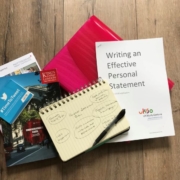UK University places are more competitive than ever
A recent article in The Times (29.06.22) states that this year’s admissions will mark the start of a “new tougher era” in the battle for university places.
According to Professor Lee Elliot Major, Professor of social mobility at Exeter University, grade inflation, a growing population of school leavers and new student loan rules from 2023, (lowering the threshold for graduates to start repaying their loans) means that this year is about to become one of the most competitive in living memory. So, Professor Major told The Times, “Students with high A-level grades will no longer be able to guarantee places” as universities have disclosed that they have fewer places on offer this year.
Personal Statment
So how can we help our students get the places they deserve? Here we have put together some tips and advice so that you can help and encourage your children to write a strong and compelling Personal Statement. We view this as a process that should not be rushed, don’t skimp on research! This particularly applies to applications to research intensive degrees (e.g. Russell Group universities). Therefore, students need to show that they are interested and self-motivated enough to read some seriously academic material. By the end of the process the student will be well prepared and set up for a successful three years or more at university.
Research and reading
- Make sure you know your shortlisted courses – look at the modules and know the difference between a BSc and a BA.
- Show your motivation for the subject and provide evidence to support your motivation. You need a wide variety of reading different academic sources not just lightweight introductory reading.
- Academics need proof that you know what you are letting yourself in for. Prove you are interested by critically engaging with the subject and reflect on what you have read.
Make it Personal
- Admissions Tutors want to get a sense of who you are – what are you offering? Are you good at languages? Tell them. Are you an ace communicator or debater? Let them know. Are you an avid scientific researcher? Write about it.
- Your extra-curricular activities are not as important as your academic achievements – talk about them in terms of skills you are offering. Negotiation, communication, time-management, leadership and teamwork are all important skills that you will be expected to have.
- Your writing style should be engaging and interesting. Use active verbs to bring your Personal Statement alive, encouraging the Admissions Tutor to read on and ultimately offer you a place.
So, have a read of our blog Personal Statement Essentials – What You Need To Know for further tips and advice. Meanwhile, UCAS provide a useful guide on writing a personal statement.
Each year UK Study Options helps students obtain some cracking university places. It’s not an easy process and the student has to put the work in. Our team of former admissions tutors provide support, guidance and expertise to cut through the confusion.
Contact us on hello@ukstudyoptions.com for details of our Personal Statement Package and how we can support you with your own Personal Statement.












